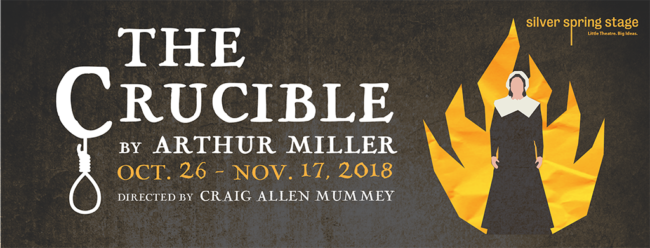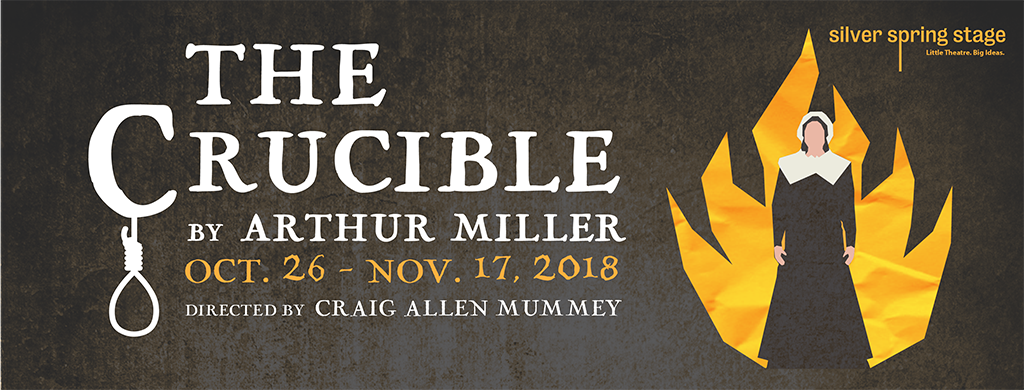Silver Spring Stage’s production of Arthur Miller’s The Crucible, directed by Craig Allen Mummey, tells the story of a fictionalized Salem, Massachusetts in 1692 as a stark fear of witchcraft spreads through the town. Miller’s story, famously an allegory for 1950’s McCarthyism, steps audiences through the dark pervasiveness of paranoia.

Standout performances include Melanie A. Lawrence as Tituba, Sophia Stringer as Mary Warren, Lennie Magida as Rebecca Nurse, Omar LaTiri as Reverend Hale, and Andrea Spitz as Elizabeth Proctor. Each was utterly captivating to watch. Lawrence held such power in her gaze on stage in the first scene, that Tituba’s presence was sorely missed throughout the rest of the play. Stringer as Mary Warren stole scenes in her monologues, deftly displaying a gamut of emotions for her friends and the trials. Magida brought stage presence and gravitas to an easily missed role. LaTiri stood out as one of the few comfortable with the stylized dialogue, and took his character smoothly through an intense arc. Most notably, Spitz absolutely shined as Elizabeth Proctor, commanding the stage with stillness and subtlety. Likewise worth noting was the set, designed by Bill Dunbar, whose sharp birch trees and ominous but versatile Tudor wall frame were both artistic and functional.
Conversely, the production was, across the board, unpolished. Every moment contained a missed detail – a court scribe writing on and passing clearly blank pages, multiple instances of John Proctor (Joseph Coracle) being told to sit down but not having anywhere to go. Costumes were likewise off, with askew collars at the starts of scenes, untied shoelaces, falling stockings, and unnatural and unnecessary Halloween wigs slapped onto significant characters, leaving the audience watching them battle with their costumes rather than listening to their performance. Stage lighting, which was otherwise aggressively amber, flashes during the court scene, and it was several instances before it was clear that it was meant to simulate lightning rather than the flickering of non-existent electricity. While there is no sound during pre-show and intermission, leaving the audience sitting in awkward silence, sound during the show provides heavy-handed imagery, opening and closing the show with overlapping whispers, and adding rolls of thunder at dramatic lines during the trial.

At over three hours, this production was lengthy – the program notably does not list a running time – made even longer by a late start, missed cues, fumbled lines, and slow scene changes. Extra length was added by an extended intermission. An unnecessary fog machine that began running mid-intermission set off the theater’s fire alarms. Audience members were told not to evacuate by someone sitting in the front row, followed by an acknowledgement that they had only tested the fog a few times.
Choices were made across the board to diminish the motivations of antagonists, turning them into punchlines for jokes, rather than rounded characters. Reverend Parris (Tristan Poje) offers Proctor a cider on his deathbed, and rather than a futile act of compassion, it is delivered as a throwaway joke, with a quick shrug. Hathorne’s (Alain Norman) melodramatic grin and shouts of, “Proctor will confess” turns a climax of the scene into a distraction. Humor is added at every possible turn to make clownish villains out of the court, all in the service of making a martyr of Proctor. Abigail Williams (Rebecca Cohen) is played as wild-eyed and one-note, constantly smirking and wiggling in the background to show her delight in all things evil. And its effect was clear on the audience, who continued to laugh in delight at dramatic turn after turn, including the heartbreaking news of Giles Corey’s (Stuart Rick) death.
Most troubling, however, is the Director’s Note from Mummey in the program. In his note, Mummey points to current events and cites The Crucible as a relevant cautionary tale. There are, as the director’s note rightly claims, parallels to modern cultural moments. But strangely, the production chose to point in a regressive direction, putting Proctor’s drive to expose Abigail’s deception on par with anti-Nazi resistance. This production does not show a Proctor who knows he slept with a child and feels that guilt. Or an Abigail who shows fear, or any emotion other than cruelty, and lashes out in hurt. It sanctifies an infallible Proctor and vilifies a moustache-twirling Abigail at every possible moment. It chooses, through their performances, to make it clear who is “good” and who is “evil” here and, according to the Director’s Note, in current events. It was its choice to make Proctor’s, “Is the accuser always holy now?” a rallying cry on the level of anti-Nazi resistance, which by the same breath, puts victims of sexual assault speaking up on par with Nazism. It was this production’s choice to ally that claim to Colin Kaepernick’s protests of the mistreatment of Black America, yet choosing only Proctor as the center of that mistreatment. And that is a dangerously false parallel.
“We are John Proctor. We are Salem,” writes Mummey. “It is a terrible thing that living honorably must be so difficult.” But there is no honor in John Proctor’s life. Over and over, he tells in his own words that he is not a good man, that the stances he takes are for selfish reasons, that his actions began this whole affair and that he is responsible. Consider instead, “We are Elizabeth Proctor,” who chooses forgiveness over anger, whose only dishonesty is in an attempt to save a life, who was not responsible for these events and yet suffered. Consider, “We are Giles Corey,” who is humanly swept up in a harmless fervor at the beginning, but when faced with consequences, would suffer any punishment to protect and preserve what remains of his family. Consider, “We are Tituba,” the slave whose mistreatment is at the heart of these events, the quickest and easiest scapegoat of the play, who loved the girls that would see her hanged, who confesses to save her own life and is broken under imprisonment and torture. But “we” are by no means John Proctor. “I am not that man,” says Proctor. “I am no good man.” There are victims of these events, but he is not one of them. We are not John Proctor. May we never be.
Silver Spring Stage’s The Crucible has individual performances that are quite compelling, and devotees of Arthur Miller will find entertainment here, but on the whole, the production is untidy, inexcusably regressive, and at odds with its own mission statement.
Running Time: 3 hours and 30 minutes with one intermission
The Crucible plays through November 17, 2018 at Silver Spring Stage, located in the Woodmoor Shopping Center— 10145 Colesville Road in Silver Spring, MD. For tickets call the box office at 301-593-6036 or purchase them online.

